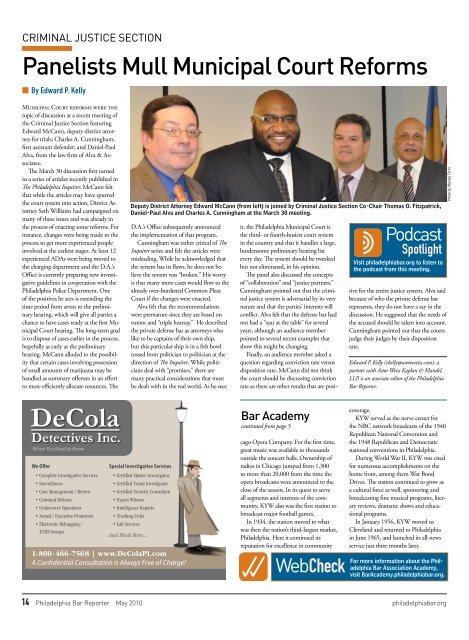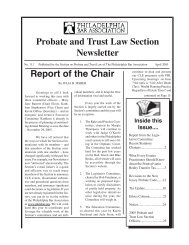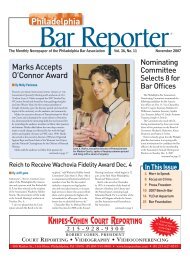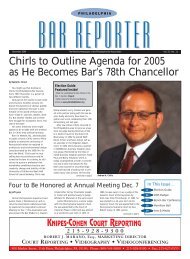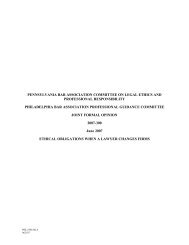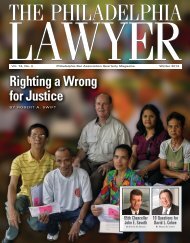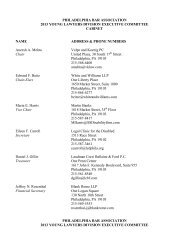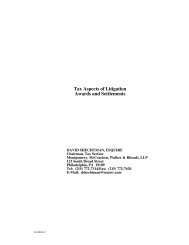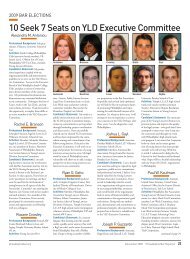May 2010 - Vol. 39, No. 5 - Philadelphia Bar Association
May 2010 - Vol. 39, No. 5 - Philadelphia Bar Association
May 2010 - Vol. 39, No. 5 - Philadelphia Bar Association
Create successful ePaper yourself
Turn your PDF publications into a flip-book with our unique Google optimized e-Paper software.
criminal justice section<br />
Panelists Mull Municipal Court Reforms<br />
n By Edward P. Kelly<br />
Municipal Court reforms were the<br />
topic of discussion at a recent meeting of<br />
the Criminal Justice Section featuring<br />
Edward McCann, deputy district attorney<br />
for trials; Charles A. Cunningham,<br />
first assistant defender; and Daniel-Paul<br />
Alva, from the law firm of Alva & Associates.<br />
The March 30 discussion first turned<br />
to a series of articles recently published in<br />
The <strong>Philadelphia</strong> Inquirer. McCann felt<br />
that while the articles may have spurred<br />
the court system into action, District Attorney<br />
Seth Williams had campaigned on<br />
many of these issues and was already in<br />
the process of enacting some reforms. For<br />
instance, changes were being made to the<br />
process to get more experienced people<br />
involved at the earliest stages. At least 12<br />
experienced ADAs were being moved to<br />
the charging department and the D.A.’s<br />
Office is currently preparing new investigative<br />
guidelines in cooperation with the<br />
<strong>Philadelphia</strong> Police Department. One<br />
of the positives he sees is extending the<br />
time period from arrest to the preliminary<br />
hearing, which will give all parties a<br />
chance to have cases ready at the first Municipal<br />
Court hearing. The long-term goal<br />
is to dispose of cases earlier in the process,<br />
hopefully as early as the preliminary<br />
hearing. McCann alluded to the possibility<br />
that certain cases involving possession<br />
of small amounts of marijuana may be<br />
handled as summary offenses in an effort<br />
to more efficiently allocate resources. The<br />
Deputy District Attorney Edward McCann (from left) is joined by Criminal Justice Section Co-Chair Thomas O. Fitzpatrick,<br />
Daniel-Paul Alva and Charles A. Cunningham at the March 30 meeting.<br />
D.A.’s Office subsequently announced<br />
the implementation of that program.<br />
Cunningham was rather critical of The<br />
Inquirer series and felt the articles were<br />
misleading. While he acknowledged that<br />
the system has its flaws, he does not believe<br />
the system was “broken.” His worry<br />
is that many more cases would flow to the<br />
already over-burdened Common Pleas<br />
Court if the changes were enacted.<br />
Alva felt that the recommendations<br />
were premature since they are based on<br />
rumor and “triple hearsay.” He described<br />
the private defense bar as attorneys who<br />
like to be captains of their own ship,<br />
but this particular ship is in a fish bowl<br />
tossed from politician to politician at the<br />
direction of The Inquirer. While politicians<br />
deal with “promises,” there are<br />
many practical considerations that must<br />
be dealt with in the real world. As he sees<br />
Podcast<br />
Spotlight<br />
Visit philadelphiabar.org to listen to<br />
the podcast from this meeting.<br />
it, the <strong>Philadelphia</strong> Municipal Court is<br />
the third- or fourth-busiest court system<br />
in the country and that it handles a large,<br />
burdensome preliminary hearing list<br />
every day. The system should be tweaked<br />
but not eliminated, in his opinion.<br />
The panel also discussed the concepts<br />
of “collaboration” and “justice partners.”<br />
Cunningham pointed out that the criminal<br />
justice system is adversarial by its very<br />
nature and that the parties’ interests will<br />
conflict. Alva felt that the defense bar had<br />
not had a “seat at the table” for several<br />
years, although an audience member<br />
pointed to several recent examples that<br />
show this might be changing.<br />
Finally, an audience member asked a<br />
question regarding conviction rate versus<br />
disposition rate. McCann did not think<br />
the court should be discussing conviction<br />
rate as there are other results that are positive<br />
for the entire justice system. Alva said<br />
because of who the private defense bar<br />
represents, they do not have a say in the<br />
discussion. He suggested that the needs of<br />
the accused should be taken into account.<br />
Cunningham pointed out that the courts<br />
judge their judges by their disposition<br />
rate.<br />
Edward P. Kelly (ekelly@astorweiss.com), a<br />
partner with Astor Weiss Kaplan & Mandel,<br />
LLP, is an associate editor of the <strong>Philadelphia</strong><br />
<strong>Bar</strong> Reporter.<br />
Photo by Wesley Terry<br />
DeCola<br />
Detectives Inc.<br />
When You Need to Know<br />
We Offer<br />
<br />
<br />
<br />
<br />
<br />
<br />
<br />
<br />
Special Investigative Services<br />
<br />
<br />
<br />
<br />
<br />
<br />
<br />
And Much More ...<br />
1- 800 - 466 -7568 | www.DeColaPI.com<br />
A Confidential Consultation is Always Free of Charge!<br />
<strong>Bar</strong> Academy<br />
continued from page 5<br />
cago Opera Company. For the first time,<br />
great music was available to thousands<br />
outside the concert halls. Ownership of<br />
radios in Chicago jumped from 1,300<br />
to more than 20,000 from the time the<br />
opera broadcasts were announced to the<br />
close of the season. In its quest to serve<br />
all segments and interests of the community,<br />
KYW also was the first station to<br />
broadcast major football games.<br />
In 1934, the station moved to what<br />
was then the nation’s third-largest market,<br />
<strong>Philadelphia</strong>. Here it continued its<br />
reputation for excellence in community<br />
WebCheck<br />
coverage.<br />
KYW served as the nerve center for<br />
the NBC network broadcasts of the 1940<br />
Republican National Convention and<br />
the 1948 Republican and Democratic<br />
national conventions in <strong>Philadelphia</strong>.<br />
During World War II, KYW was cited<br />
for numerous accomplishments on the<br />
home front, among them War Bond<br />
Drives. The station continued to grow as<br />
a cultural force as well, sponsoring and<br />
broadcasting fine musical programs, literary<br />
reviews, dramatic shows and educational<br />
programs.<br />
In January 1956, KYW moved to<br />
Cleveland and returned to <strong>Philadelphia</strong><br />
in June 1965, and launched its all-news<br />
service just three months later.<br />
For more information about the <strong>Philadelphia</strong><br />
<strong>Bar</strong> <strong>Association</strong> Academy,<br />
visit <strong>Bar</strong>Academy.philadelphiabar.org.<br />
14 <strong>Philadelphia</strong> <strong>Bar</strong> Reporter <strong>May</strong> <strong>2010</strong> philadelphiabar.org


